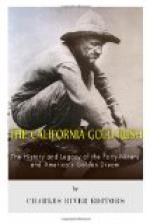In the present instance he rode down from Sutter’s Fort, where he then had a store, bringing with him gold-dust and nuggets from the new placers. “Gold! Gold! Gold from the American River!” shouted Brannan, as he strode down the street, swinging his hat in one hand and holding aloft the bottle of gold-dust in the other. This he displayed to the crowd that immediately gathered. With such a start, this new interest brought about a stampede that nearly depopulated the city.
The fever spread. People scrambled to the mines from all parts of the State. Practically every able-bodied man in the community, except the Spanish Californians, who as usual did not join this new enterprise with any unanimity, took at least a try at the diggings. Not only did they desert almost every sort of industry, but soldiers left the ranks and sailors the ships, so that often a ship was left in sole charge of its captain. All of American and foreign California moved to the foothills.
Then ensued the brief period so affectionately described in all literalness as the Arcadian Age. Men drank and gambled and enjoyed themselves in the rough manner of mining camps; but they were hardly ever drunken and in no instance dishonest. In all literalness the miners kept their gold-dust in tin cans and similar receptacles, on shelves, unguarded in tents or open cabins. Even quarrels and disorder were practically unknown. The communities were individualistic in the extreme, and yet, with the Anglo-Saxon love of order, they adopted rules and regulations and simple forms of government that proved entirely adequate to their needs. When the “good old days” are mentioned with the lingering regret associated with that phrase, the reference is to this brief period that came between the actual discovery and appreciation of gold and the influx from abroad that came in the following years.
This condition was principally due to the class of men concerned. The earliest miners were a very different lot from the majority of those who arrived in the next few years. They were mostly the original population, who had come out either as pioneers or in the government service. They included the discharged soldiers of Stevenson’s regiment of New York Volunteers, who had been detailed for the war but who had arrived a little late, the so-called Mormon Battalion, Sam Brannan’s immigrants, and those who had come as settlers since 1842. They were a rough lot with both the virtues and the defects of the pioneer. Nevertheless among their most marked characteristics were their honesty and their kindness. Hittell gives an incident that illustrates the latter trait very well. “It was a little camp, the name of which is not given and perhaps is not important. The day was a hot one when a youth of sixteen came limping along, footsore, weary, hungry, and penniless. There were at least thirty robust miners at work in the ravine and it may well be believed they were cheerful, probably now




